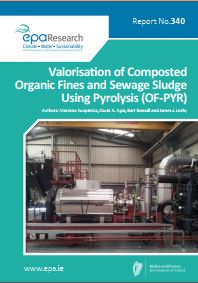Research 340: Valorisation of Composted Organic Fines and Sewage Sludge Using Pyrolysis (OF-PYR)
Authors: Marzena Kwapinska, David A. Agar, Bart Bonsall and James J. Leahy
Summary: In Ireland, organic “fines” residue, derived from the separation of municipal solid waste and sewage sludge from municipal wastewater treatment plants, are currently processed for disposal as wastes. The Valorisation of Composted Organic Fines and Sewage Sludge Using Pyrolysis project (OF-PYR) investigated the potential of slow pyrolysis as a technology for their treatment as an alternative to other disposal options.

Waste & resource management :: Environmental Protection Agency, Ireland
https://www.epa.ie/media/epa-2020/publications/research/Thumbnail_340.jpg